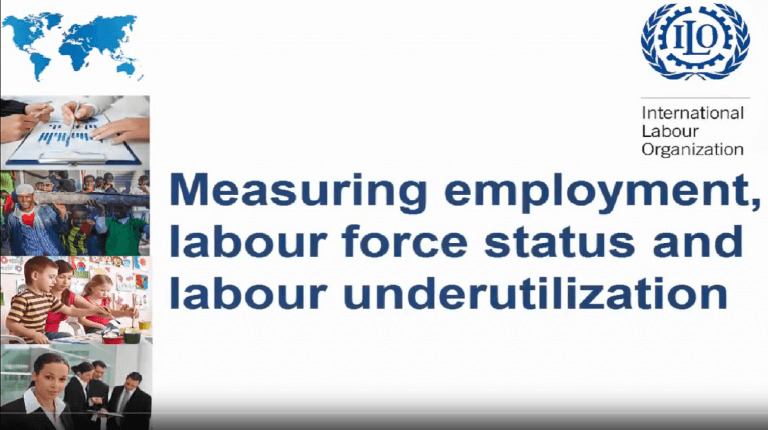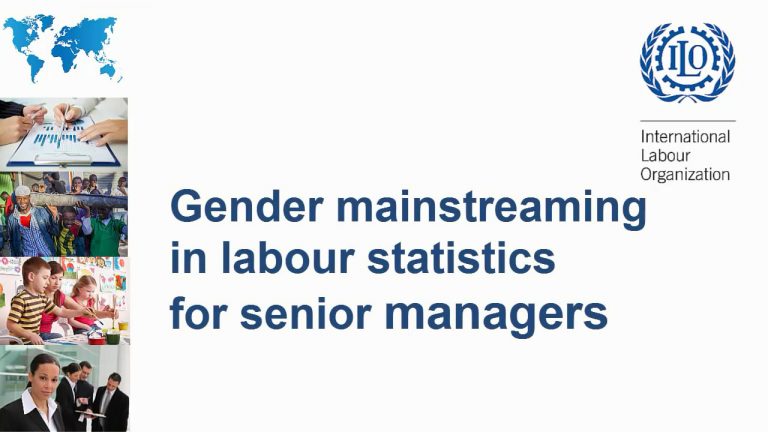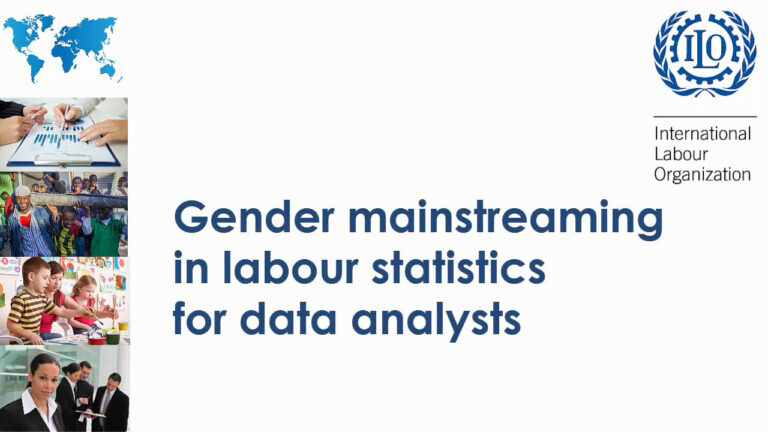The adoption of the Sustainable Development Goals (SDGs) of Agenda 2030 for Sustainable Development highlights the world’s commitment to sustainable and inclusive growth. Indicators were established to enable global, regional and national monitoring of the SDGs, including a selective set intended to support high level monitoring of decent work and gender equality in the world of work. This global effort has increased demands of policy makers and social partners for high quality statistical data and analysis, particularly from countries in the developing world where the existing statistical system may not allow for the regular production of timely, reliable and relevant labour statistics.
To meet the challenges posed by the ever-increasing demand for high quality information, countries need to strengthen their capacity in the planning, collection and analysis of labour statistics across a range of topics. We can help.
Training
Statistical training activities serve to strengthen technical capacity at the national level to support the production of authoritative analytical reports on the labour market and other decent work topics in support of evidence-based policies. We offer various training courses and workshops as well as online training on specific topics, including international statistical standards, data collection, data production, and SDGs.
Our flagship training course is the annual Labour Market Statistics and Analysis Academy, offered in English, French and Spanish. The Academy focuses on strengthening household surveys to support the development of decent work-related SDG indicators and closing gender data gaps in work statistics to support gender equality in the world of work.
The Labour Market Statistics and Analysis Academy
The Academy is held annually. It offers a curricula covering the full statistical production process from high level planning and identification of core indicators to be constructed, to questionnaire design, indicator calculation, analysis, interpretation and communication of the results. To meet the demand for SDG indicators to promote inclusive development, the issue of gender mainstreaming in labour statistics is addressed and highlighted throughout the activities.
The Academy targets in particular:
(1) Labour Statisticians from national statistical offices, Ministries of Labour and related institutions (such as labour observatories) from ILO member countries, in particular from developing countries;
(2) Employment and development policy analysts from national statistical offices, government ministries, research and academic institutions, labour observatories, international organisations and donor organisations; and
(3) Senior Managers from national statistical offices and departments in Ministries of Labour and related institutions (such as labour observatories) dealing with the production and dissemination of labour market statistics.
Upcoming training

Measuring migrant recruitment costs for SDG indicator 10.7.1
This free e-course is available on eCampus, ITCILO’s online learning platform.
This self-paced e-course on measuring migrant recruitment costs provides an overview on how to produce data on SDG Indicator 10.7.1 to track progress towards achieving safe, orderly, and regular migration. It covers global commitments, the definition of recruitment costs, data collection methods, indicator calculation, analysis, and reporting for informed decision-making.

Measuring skills mismatches
23 March–17 April 2026
Online (ITC E-Campus)
The course is designed to enhance capacities to identify, collect, analyse and disseminate labour market information related to skills imbalances from both the demand supply side.

Measuring informality
27 April–22 May 2026
Online (ITC E-Campus)
The course is designed for participants to better understand the functioning of the informal economy and the measurement of informality.
Online tutorials
ILO training supports the implementation of international labour statistics standards at the national level and relies on the use of specific guidance tools and manuals. The ILO offers various training courses and seminars as well as online training tools on specific topics. Select a video below to learn more about concepts and issues in labour statistics.
Playlist

10:50

2:51

15:54

15:24

1:00:36

10:58

13:28

21:12
Why labour statistics matter
Rafael Diez de Medina, Chief Statistician and Director of ILO’s Department of Statistics explains why labour statistics are important, how they are evolving, and how they can help to address key world of work issues such as skills availability and decent work in the informal sector and the care economy.
How can good data help measure development goals?
Labour market statistics play a critical role in quantifying issues such as poverty, job creation, social security, child labour and others. Reliable, well-sourced data helps formulate robust policies and ensures successful monitoring, and implementation of the ILO Decent work agenda and the 2030 agenda of the UN Sustainable Developmental Goals.
Measuring work in official statistics: The new international standards
In 2013, new international standards that promote measuring all forms of work were adopted by the International Conference of Labour Statisticians (19th ICLS). The new standards introduced an innovative framework that recognizes all productive activities, whether paid or unpaid, as work.
Measuring employment, labour force status and labour underutilization
Africa Gender Data Network Webinar: Methodological Research on Approaches to Gender Data Collection
This webinar highlights the relevance of the latest ICLS standards on work statistics to shed light on gender issues in the world of work, and the importance of good survey design and analysis to render visible women’s paid and unpaid work.
Gender mainstreaming for senior managers
Gender mainstreaming for data analysts
COVID-19: Guidance to data producers to maintain labour force survey data collection
The COVID-19 pandemic is impacting Labour Force Survey data collection in many ways. The most immediate impact for most countries is the suspension of face-to-face interviewing, with a move to telephone interviewing being the main approach under consideration by many. This note provides guidance to countries on the range of options available and challenges to deal with in order to change their data collection approach and maintain some continuity in data availability to the extent possible.

Rafael Diez de Medina, Chief Statistician and Director of ILO’s Department of Statistics explains why labour statistics are important, how they are evolving, and how they can help to address key world of work issues such as skills availability and decent work in the informal sector and the care economy.
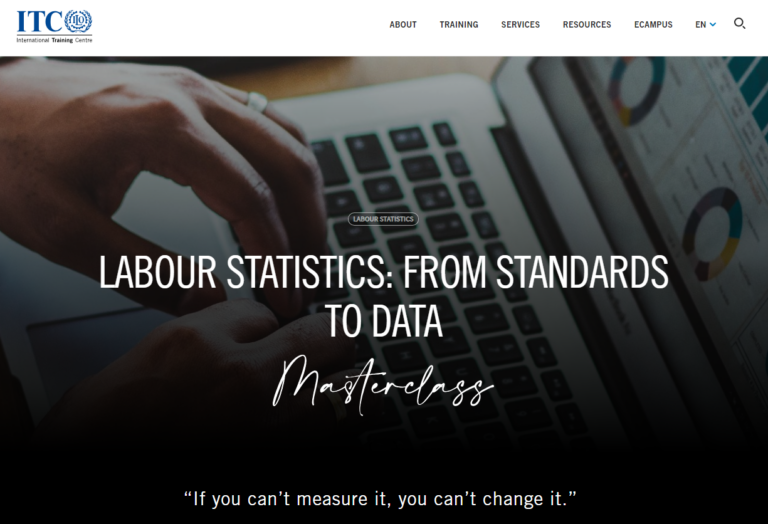
In this ITC Masterclass series of 9 video lessons, learn about labour statistics, their importance in understanding labour markets, and the significance of standard-setting for consistent and comparable data. Registration required.
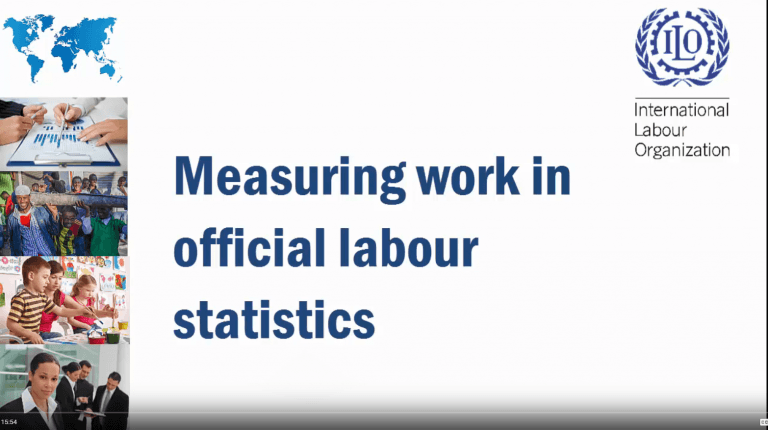
In 2013, new international standards that promote measuring all forms of work were adopted by the International Conference of Labour Statisticians (19th ICLS). The new standards introduced an innovative framework that recognizes all productive activities, whether paid or unpaid, as work.

Labour market statistics play a critical role in quantifying issues such as poverty, job creation, social security, child labour and others. Reliable, well-sourced data helps formulate robust policies and ensures successful monitoring, and implementation of the ILO Decent work agenda and the 2030 agenda of the UN Sustainable Developmental Goals.
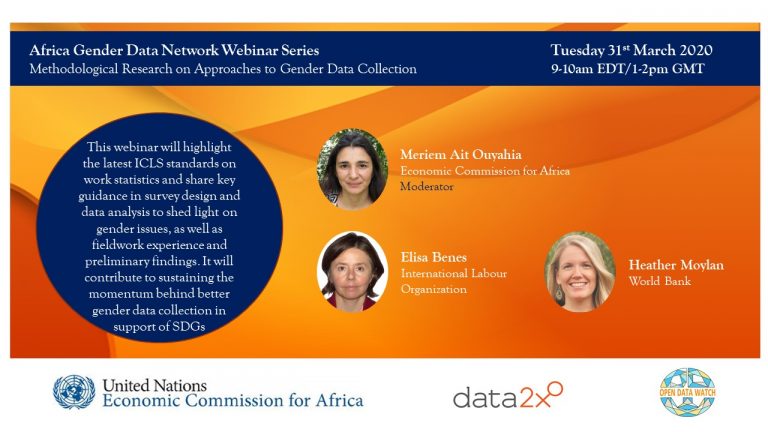
This webinar highlights the relevance of the latest ICLS standards on work statistics to shed light on gender issues in the world of work, and the importance of good survey design and analysis to render visible women’s paid and unpaid work.

The COVID-19 pandemic is impacting Labour Force Survey data collection in many ways. The most immediate impact for most countries is the suspension of face-to-face interviewing, with a move to telephone interviewing being the main approach under consideration by many. This note provides guidance to countries on the range of options available and challenges to deal with in order to change their data collection approach and maintain some continuity in data availability to the extent possible.
Technical assistance
We provide technical assistance and tools for different phases of the Generic Statistical Business Process Model (GSBPM). GSBPM is a means to describe statistics production in a general and process-oriented way. It is used both within and between statistical offices as a common basis for work with statistics production in different ways, such as quality, efficiency, standardisation, and process-orientation. It is used for all types of surveys, however, our technical assistance is generally focused on labour force surveys. Click on a phase below to find out how we can help. Also see our current technical assistance projects.
1. Specify needs
The selection of a broad priority set of decent work indicators for which timely and reliable estimates can be produced with regular frequency is essential to measuring the progress towards decent work in a given economy. The ILO’s framework on the measurement of decent work covers 10 substantive elements which are closely linked to the four strategic pillars of the Decent Work Agenda: standards and rights at work, employment creation, social protection and social dialogue. The framework is described in detail in the ILO manual on Decent Work Indicators, Guidelines for producers and users of statistical and legal framework indicators.
Also refer to our concepts and definitions page, which includes links to statistical standards (i.e., resolutions and guidelines), international classifications, guides and manuals, database descriptions and a glossary.
2. Design
In designing the sampling frame, refer to:
Also, no need to re-invent the wheel when designing the questions for your labour force survey if you’re trying to implement the latest standards. The ILO Model Labour Force Survey for CAPI and PAPI are available in LFS resources.
3. Collect
If you are using the ILO Model LFS, there are two ways of collecting your survey data using CSPro. With the Program Builder and NatAd tools you can build a CAPI application and carry out the data collection using Android mobile devices. If you choose to use the PAPI collection method, we can provide the CSPro Data Entry program ready to enter the PAPI questionnaire. [Expected Delivery: 30/06/2019]
CSWeb+ is a server-based application which provides two main crucial functions for this phase: the administration of the data collection field operations (including sample distribution) and the synchronization (merging) of the data collected/entered into a single database. An Operations Dashboard provides real time information on the advance of the survey data collection. [Expected Delivery (version 1.0): 31/07/2019]
Feel free to contact us if you need further information on how we can assist you with the data collection phase
4. Process
If you used the ILO’s LFS Resources in the previous phases, the ISVGenerator (provided for CSPro and Stata microdata) will generate the ILO Standard Variables to facilitate the calculation of derived indicators from different frameworks like the Decent Work Indicators or SDGs. The algorithms in ISVGenerator follow the lastest recommendations of the ICLS and other relevant standards to ensure international comparability.
SMART is a powerful tool for data management and simple to use for aggregation and data reporting. If your microdata includes the ILO Standard Variables, the SMARTER version (SMART Easy Reporting) can automatically generate the datasets for reporting to ILOSTAT and/or SDG indicators with two clicks.
5. Analyse
During the analysis phase, consider using some of our publications for the interpretation and explanation of outputs:
6. Disseminate
We offer .Stat Suite, built by the SIS-CC, as a dissemination platform for labour statistics. Contact us to learn more.
7. Evaluate
This phase is made up of three sub-processes — gathering evaluation inputs, conducting evaluations and agreeing on action plans — and is typically carried out by the data producer. We do not currently offer any related tools or services at this phase.
In addition to using our online resources, you will need to contact us for personalized technical advice. We support member States with the implementation of international statistical standards, data production, analysis and dissemination. Our areas of expertise are focused on labour force surveys and on labour market information systems.
Related pages
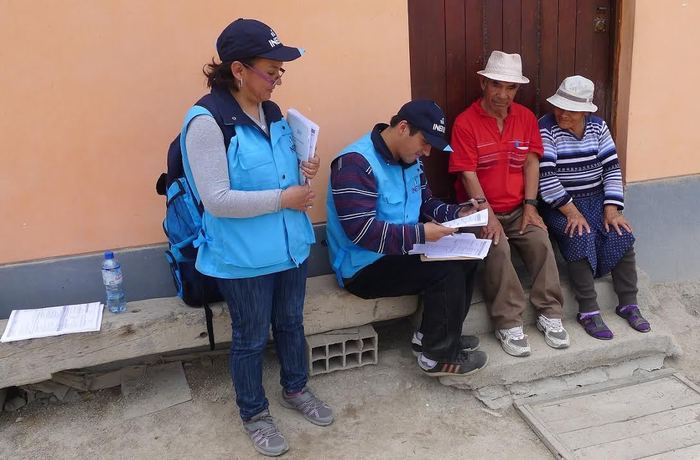
Labour force survey (LFS) questionnaire toolkit
Online resources for data producers to build or improve their labour force survey, such as PAPI and CAPI model questionnaires.

Communication of statistics
Resources for data producers to ensure an effective communication of statistics and methodologies, to make the most of the data produced and avoid misinterpretation, especially

Administrative data sources for labour statistics
Online resources for data producers and users to make the most of administrative data sources for labour statistics, in the absence of or in complementarity

Population Census resources
Online resources for data producers to improve their population census to be in line with the latest international statistical standards for labour.

Establishment surveys for labour statistics
Online resources for data producers and users to make the most of administrative data sources for labour statistics, in the absence of or in complementarity
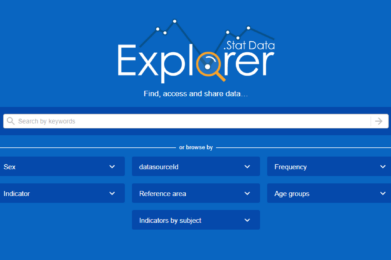
Labour market information systems (LMIS)
Learn more about LMIS and what the ILO can offer in terms of tools, capacity building activities and technical assistance in labour statistics.

Calendar
See the upcoming schedule for major events, training and workshops in labour statistics.

